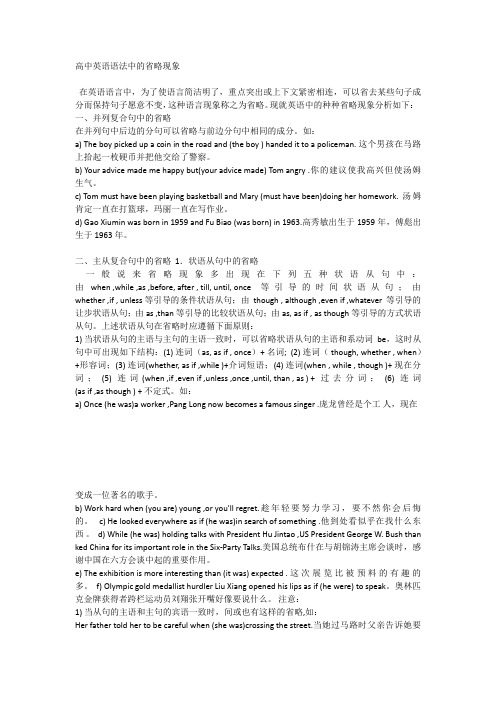英语语法省略
英语语法中的省略现象

高中英语语法中的省略现象在英语语言中,为了使语言简洁明了,重点突出或上下文紧密相连,可以省去某些句子成分而保持句子愿意不变,这种语言现象称之为省略。
现就英语中的种种省略现象分析如下:一、并列复合句中的省略在并列句中后边的分句可以省略与前边分句中相同的成分。
如:a) The boy picked up a coin in the road and (the boy ) handed it to a policeman. 这个男孩在马路上拾起一枚硬币并把他交给了警察。
b) Your advice made me happy but(your advice made) Tom angry .你的建议使我高兴但使汤姆生气。
c) Tom must have been playing basketball and Mary (must have been)doing her homework. 汤姆肯定一直在打篮球,玛丽一直在写作业。
d) Gao Xiumin was born in 1959 and Fu Biao (was born) in 1963.高秀敏出生于1959年,傅彪出生于1963年。
二、主从复合句中的省略 1.状语从句中的省略一般说来省略现象多出现在下列五种状语从句中:由 when ,while ,as ,before, after , till, until, once等引导的时间状语从句;由whether ,if , unless 等引导的条件状语从句;由though , although ,even if ,whatever等引导的让步状语从句;由 as ,than 等引导的比较状语从句;由as, as if , as though 等引导的方式状语从句。
上述状语从句在省略时应遵循下面原则:1) 当状语从句的主语与主句的主语一致时,可以省略状语从句的主语和系动词be,这时从句中可出现如下结构:(1) 连词(as, as if , once)+ 名词; (2) 连词( though, whether , when)+形容词;(3) 连词(whether, as if ,while )+介词短语;(4) 连词(when , while , though )+ 现在分词; (5) 连词(when ,if ,even if ,unless ,once ,until, than , as ) + 过去分词; (6) 连词(as if ,as though ) + 不定式。
英语语法中的省略有哪些

英语语法中的省略有哪些英语是按照分布面积而言最流行的语言,但母语者数量是世界第三,仅次于汉语、西班牙语。
它是学习最广泛的第二语言,是近60个主权国家的官方语言或官方语言之一。
下面是店铺为大家收集的英语语法中的省略有哪些,欢迎阅读,希望大家能够喜欢。
英语语法中的省略有哪些一、并列复合句中某些相同成分的省略。
二、在when,while,if,asif,though(或although),as,until,once,whether,unless,where等连词连接的状语从句中,常省略跟主句相同的主语和be动词。
三、当见到“when(或if,where,wherever,whenever,assoonas,asfastas,than等)+possible/necessary等”时,可理解中间省略了itis(或was)。
四、有形式主语it的主语从句可省略that。
五、在限制性定语从句中可省略作宾语的关系代词whom,which,that。
六、在direction(方向),way(方式),distance(距离),time(时间),times(倍数)等后面所接的定语从句中常省略that,which,inwhich。
七、以therebe开头的句子,其主语的定语从句常可省略关联词,而therebe结构作定语从句时,省略作主语的关系代词。
八、命令句、惊叹句、部分第一人称的陈述句、部分问句和答句中省略最为常见。
九、用so,not或其它手段来省略上文或问句中的'一部分或整个句义。
小升初英语语法省略句知识点1. 省略句的定义省略是为了避免重复、突出新信息并使上下文紧密连接的一种语法修辞手段。
省略在语言中,尤其在对话中,是一种十分普遍的现象。
2.小品词的省略1)省略介词I ‘ ve studied English (for) five years. 我已学五年英语了。
2)省略连词thatI believe (that) you will succeed . 我相信你们会成功的。
英语语法19之省略

三、其他句型中的省略
1.“It be/I am等 + 名词或形容词(+从句)”结构中,重点在后面的内容,因此 前面主语和系动词常省略。 举例:(It is a) pity (that) you missed the film last night.
(It was) Lucy enough for me to have found the right way in the end. 2.主语补语或宾语补语中的to be往往省略。 举例:These instruments are thought (to be) very important.
All our cadres,whatever their rank (may be),are servants of the people. 6.虚拟语气中should或连词if的省略 举例:He ordered that everything (should) be ready before beginning the test.
英语语法省略句

省略句1)不定式在love, mean, want, like, wish, expect, try, intend, plan, refuse, prefer, seem等动词后面2)在happy,glad,eager,ready,willing等形容词后面。
1.---will you join us?--- I should love to(join you).2.I asked him to see the fil m, but he didn’t want to(see the film).3.--- Would you like to go with us?--- Yes, I’m glad to(go with you)4.He doesn’t get up early as he used to. (get up)注意: 如果不定式中含有be, have(助动词), have been, 通常保留be, have(助动词), have been.1.--- Are you a sailor?--- No, but I used to be.2.---He hasn’t finished yet.---well, he ought to have.1. —I'll be away on a business trip. Would you mind looking after my cat?—Not at all, ________ . (NMET 1995)A. I have no timeB. I'd rather notC. I‘d like itD. I'd be happy to2. —Does your brother intend to study German?—Yes, he intends ________ . (NMET 1998上海卷)A. /B. toC. soD. that5.--- He hasn’t gone to the office up to now.--- Well, he _____.A. shouldB. ought toC. ought to goD. ought to have4. —You should have thanked her before you left.—I meant ________ , but when I was leaving I couldn't find her anywhere. (NMET 2000北京春招卷)A. to doB. toC. doingD. doing to替代词so / not用于避免重复前面所说过的内容。
英语语法 省略句在句子中的作用是什么

英语语法省略句在句子中的作用是什么省略句是指在句子中省略了某个成分,但读者或听者可以根据上下文推断出被省略的内容。
省略句在英语语法中起到简化句子结构、提高语言流畅度和避免重复的作用。
1. 简化句子结构:省略句可以简化句子结构,使句子更加简洁明了。
通过省略一些可推断的成分,可以避免冗余和重复,使句子更简洁、更易理解。
例如:- She can play the piano, and he can too.(她会弹钢琴,他也会。
)- She can play the piano, and he can as well.(她会弹钢琴,他也会。
)2. 提高语言流畅度:省略句可以提高语言的流畅度,使句子更自然、更流畅。
通过省略一些常见的成分,可以避免冗长和啰嗦,使句子更加简洁有力,增加语言的节奏感。
例如:- I like coffee, and she does too.(我喜欢咖啡,她也喜欢。
)- I like coffee, and she likes it as well.(我喜欢咖啡,她也喜欢。
)3. 避免重复:省略句可以避免重复使用相同的词语或短语,使句子更加清晰、更加连贯。
通过省略一些可推断的信息,可以避免重复表达相同的意思,提高句子的表达效果。
例如:- John bought a new car, and Mary bought one too.(约翰买了一辆新车,玛丽也买了一辆。
)- John bought a new car, and Mary bought a new car as well.(约翰买了一辆新车,玛丽也买了一辆。
)虽然省略句可以使句子更加简洁、流畅和连贯,但在使用省略句时需要注意以下几点:1. 上下文的清晰性:省略句需要依赖上下文来推断被省略的内容,因此上下文的清晰性对于理解省略句至关重要。
如果上下文不清晰或含糊不清,可能会导致误解或理解困难。
2. 受限于语境:省略句的使用受限于特定的语境和语言环境。
[英语语法]省略句
![[英语语法]省略句](https://img.taocdn.com/s3/m/7c175fe8102de2bd96058823.png)
省略句定义:为了使语言简洁或避免重复,要省略句中的一个或几个成分,这种语法现象称之为省略。
英语中省略现象较为普遍,对省略的考查已成为高考中的热点。
句子成分的省略,可分为以下几种情况:1.省略主语,主谓语或主谓的一部分2.不定式符号to的省略3.不定式结构中动词的省略4.状语从句中的省略5.定语从句中关系词的省略6.虚拟语气中if和should的省略7.考查not,so,neither,nor的“替代性”省略省略句常见情况具体分析:1,在有and连接的句子中为了避免重复,长省略一些重复的词或者词组:1),省略共同的主语或者宾语。
Mr Smith picked up a coin on the road and (Mr Smith) handed it to a policeman.2),若主语不同,而谓语,助动词或者情态动词相同,则省略后面的助动词或情态动词。
Jack must have been playing football and Mary (must have been ) doing her homework.3), 若主语与谓语动词相同,则省略后面的主谓成分。
His advice made me happy, but (his advice made) Jim angry.4),若主语不同的话,但主要动词及后续部分相同,则省略主要动词及后续部分。
I was born in winter 1998, and Bob (was born ) in 1989.5) 省略重复的介词,连词及后续部分。
He was late because he had overslept and (because he had ) missed the train.2,状语从句的省略1),在when, while, whenever, till, as soon as, if, unless, as if, though 等引导的状语从句中,其实是:包括时间,让步,方式等一些状语从句中,若从句主语和主句主语相同,或者是it时,且从句的主语为be动词时,则从句中的主语和be动词常全部被省略。
高中英语语法精讲——省略句
省略句定义:省略是一种修辞手段,省略的使用是为了避免重复。
同时,不损害句子结构,不会引起歧义。
一.功能词的省略1.冠词的省略1)两个并列名词前面都有冠词时,第二个名词前的冠词常可以被省略。
Can we have a medical examination at home without a doctor or (a) nurse?家里没有医生或护士我们能进行医疗检查吗?注意:有些句子如果省略了第二个冠词,会误认为指同一个人,省略时应注意。
They are the gardener and the gatekeeper.他们一个是花园园丁,一个是门卫。
2)表示头衔、职位,而不是这个职业所具体指的那个人时,常省略冠词。
Mary, head of our team, was determined to give up this game.我们的队长玛丽决定放弃这一局比赛。
2.介词的省略1)yesterday afternoon/evening/morning, Sunday, Saturday等时间名词前的介词常省略。
She started work (on) last Monday.她从上个星期一开始工作。
2)for引导的表示一段时间的名词短语,一般for可以省略。
I stayed in Washington (for) four years.我在华盛顿待了四年。
注意:在句首或在否定句中时,“for+一段时间”的短语中不能省略for.I haven't heard from him for a long time.我很长时间没有收到他的来信了。
For a whole year, I was helping my dad on the farm.一整年我都在农场帮我爸爸。
3)of与age, size, color, height, material, shape等表示大小、长短、颜色、年龄、形状、高度等的名词连用时,常被省略。
英语语法---省略
省略1简单句中的省略2并列句中的省略3复合句中的省略4其他的省略情况1.省略主语2.省略宾语3.省略主语和谓语(或谓语的一部分)1.动词不定式的省略2.某些使役动词,如:m a k e,le t,h a v e等和感官动词,如:see,w a t c h,no ti ce,o b ser v e,h ear等后⾯作宾补的不定式须省略t o,但若这些动词⽤于被动语态,则t o不省略。
3.并列的不定式可以省略后⾯的不定式符号t o。
但若两个不定式之间表⽰对⽐关系时,不能省略t o。
4.当不定式在某些动词后作宾语时,常可省略。
常⻅的动词有agree,a ff or d,e xp ec t,f orge t,h o p e,k no w,m anage,p re t en d,re m e mb er,re f use,w an t,wi s h,w oul d l ik e等。
5.介词b u t,e x ce pt (除了) 前有实义动词d o的某种形式时,后⾯的不定式不带t o。
6.当不定式作某些复合谓语时,如b e go i ng t o,b e a b le t o,h a v e t o,oug ht t o,use d t o等,可只保留不定式符号t o。
7.使⽤so,no t等时的省略8.介词的省略(Y ou co m e) Thi s w a y,p lease. 请这边⾛。
(省略了主语和谓语) (Ha v e y ou) G o t an y i n k? 你有墨⽔吗?(省略了主语和谓语的一部分)常⻅的结构有: (1)h a v e diffi cul ty/t rou b le (i n) d o i ng s th. (2)b e b us y (i n) d o i ng s th. (3)s p en d so m e tim e (i n) d o i ng s th. (4)s t o p/p re v en t s b. (f ro m) d o i ng s th. Th e h ea vy ra i n p re v en t e d him (f ro m) arr ivi ng th ere on tim e.—Can y ou fi n i s h y our w or k t o d a y? —I thi n k so./I d on’t thi n k so./I thi n k no t. ——你今天能完成⼯作吗? ——我认为能。
高中英语语法_省略
高中英语语法_省略高中英语语法:省略现象解析在英语语法中,省略是一种常见的语言现象。
它指的是在某些语境中,一些语言成分可以省略,而不会影响句子的完整性和理解。
省略现象主要出现在句子、从句或介词短语中。
本文将通过分析省略现象,帮助高中生更好地掌握英语语法。
一、句子的省略在英语中,省略句子成分是很常见的。
以下是一些常见的省略句子成分的情况:1、省略主语在某些情况下,句子可以省略主语,而不会影响句子的意思。
例如:(1)Sorry, I can't come. (我无法来。
)(2)Open the door, please. (请开门。
)2、省略谓语在一些简单句或祈使句中,谓语动词经常被省略。
例如:(1)Wash your hands before meals. (饭前要洗手。
)(2)Pick up the book on the floor. (把地上的书捡起来。
)3、省略宾语在一些简单句中,宾语可以省略。
例如:(1)She wants to buy a new dress. (她想买个新裙子。
)(2)I like eating fruits. (我喜欢吃水果。
)二、从句的省略在英语中,从句的省略现象也很常见。
以下是一些常见的从句省略情况:1、省略主语和谓语在定语从句中,如果主语和谓语与先行词一致,可以省略它们。
例如:(1)The man who is standing under the tree is my brother. (站在树下的那个男人是我的哥哥。
)(2)The book that you lent me is very interesting. (你借给我的那本书很有趣。
)2、省略作主语的代词和be动词在由that引导的定语从句中,作主语的代词和be动词通常可以省略。
例如:(1)The child (that) I taught is now a doctor. (我教过的那个孩子现在是一名医生。
高中英语语法省略句
shorter
2 Mr Smith picked up a coin in the road and Mr Smith
handed it to a policeman
省略共同的主语或宾语
3 Jack must have been playing football and Mary must
have been doing her homework
: –Are you an engineer – No; but I want tobe : –He hasn’t finished the task yet
–Well; he ought to have
Attention
使役动词及感官动词后面作宾语补足语的不定 式一定要省去to;但在被动语态中须将to复原
: The order that weshsohuoludld stay where we are is very serious and severe
: It’s very important that studentsshsohuoludld study hard at school
※介词的省略※考点
从句中有一些成分被省略 而用so或not来代替
: Are you leaving for Beijing this Sunday I think so so I’m leaving for Beijing this Sunday
: Tom must be free today If so;sohe can help us
4 同时省略几个成分
: Let’s meet at the same place aswe met
yesterday
同时省略主 谓语
- 1、下载文档前请自行甄别文档内容的完整性,平台不提供额外的编辑、内容补充、找答案等附加服务。
- 2、"仅部分预览"的文档,不可在线预览部分如存在完整性等问题,可反馈申请退款(可完整预览的文档不适用该条件!)。
- 3、如文档侵犯您的权益,请联系客服反馈,我们会尽快为您处理(人工客服工作时间:9:00-18:30)。
I. 句首省略:在非正式谈话中,如果意思 清楚,句首的非重读词语常常省略。 可以省略的词包括冠词a/an, the、物 主代词 my, your等、人称代词I , you等、助动词 am, have等、和 there be句型中的there。例如:
4) 在would like/ love/ hate/ prefer, want和choose后面通常不能省略to:
1. ---Are you interested in going to university? ---I’d like to. 2. Her parents encouraged her to study art, but she didn’t want to. 然而当want 和like用于从句中时,to常略: 1. Come when you want.
2) 在than或as引起的从句中的省略: 如果意思清楚,as和 than后的词可省略: • Many others are doing better than we are. • He works harder than ever. • They will try to put the plan into practice as soon as possible.
出现在并列句中的be, have, do,如果在 一个分句中作助动词,而在另一个分 句中作行为动词,则不可省略: 1. The man has a gun and has threatened to use it. 2. Mary did the work but did not finish it. 并列句的省略有时还可出现在前面的分 句中,这时被省略的词语便出现在下文: George will (take the course) and Bob might take the course.
4) 在限定性定语从句中作宾语的关系代 词可以省略: 1. What do you think of the film we saw last night? 2. She is somebody I really can’t tolerate.
X if anything, if any, if ever, if so, if not
III. 介词的省略 1)在以next, last, this, that, these, those, one, every, each, some, any, all等开始的一些表示时间的常 用词组前面以及tomorrow morning, yesterday afternoon前面,不用介 词: 1. See you next Saturday. 2. I’ll never forget meeting you that afternoon. 3. We met one Tuesday in August. 4. Come any day you like. 5. The party lasted all night.
7) 在非正式文体中,与place连用的一 些词组里,to可以省略: 1. Let’s go some place where it’s quiet. 2. He doesn’t have money to go places.
在非正式文体中,在place, day, way, time+不 定式+介词结构中,可省略介词: 1. They need a place to live (in). 2. She has no place to go (to). 3. I can't think of a worse way to spend my time.
II. 答语的省略
答语在语法上经常不完整,因为不需要重复刚 才说过的话。 1. ---Have you finished your composition? ---Not yet. 2. ---Linda has arrived. ---when? 3. ---He won’t go to the party. ---why not?
2. I have decided to do what I like.
•
注意:如果不定式为to be和to have “有”, 时,则不能省略。如: 1. He has not been promoted yet, but she ought to be. 2. You have got more challenges than you used to have. 3. Are you a sailor? No, but I used to be.
1) if anything在比较结构中,表示“如果有 区别的话”;还可表示“如果有……的 话”;另一含义是:“相反,反而”: 1.The carriages of German state railways are, if anything, better than those of the large French companies. 2. True greatness has little, if anything, to do with rank or power. 3. Your suggestion could only make things worse if anything.
IV.不定式的省略
1)如果意思清楚的话,可以用to代替整 个不定式: 1. I went there because I want to. 2. ---will you join us? ---Yes I’d love to.
2)在and 或or连接的不定式并列结构中,第 二个不定式的to通常省去。如: • I will ask them to come over and talk the matter over.
V.并列成分和并列句中的省略现象 当用and, but或or连接词语和句子时,常可省略 各种重复的词: 1. a knife and (a) fork; 2. in France, Germany or Spain 3. His office was on the tenth floor, and hers (office was) on the twelfth (floor). 4. I’ll buy a house. He will (buy a house) too. 5. John was the winner in1994, and Bob (was the winner) in 1995. 6. She can read, but can’t write.
3)在某些动词后可省略整个动词不定 式。这种情况常出现在名词和形容词 以及try后:
1. ---Can you start the car?
---Ok, I will try. 2. You can’t force him to get a job if he is not ready (to). 3. He’ll never leave home; he hasn’t got the nerve (to).
2)在非正式文体中,尤其在美国,一周七天 前面的on有时省略:
• And see you Monday. 3)在非正式文体中,在about +时间词组 前面at经常省略: • I’ll see you about 3 o’clock. 4) 在非正式文体中,表示某事维持多长 时间的词组里,for常省略: • We have lived here (for) ten years.
2) 在somewhere, anywhere, everywhere, nowhere和place后,常 用that代替where, 或者省略: 1. Have you got anywhere (that) I can lie down for a while? 2. We need a place (that) we can stay for a few days.
VII. 引导宾语从句的连词以及形容词后面的 that通常都可省略。 • I hope (that) all will go well. • We were surprised (that) he came. 但如果从句较长或从句的语境较复杂, 连词 that 不能省略: 1. She has made it clear that she will have nothing to do with him. 2. Everybody could see what an important person he was, and that they ought to be careful not to offend him.
在简略答语中,如果句子无动词,要用宾格 代词作主语,而不用主格代词: 1. ---Who wants a ride in my car? ---Me!/ Not me! 2. ---I hear you’re a professor. ---Me a professor! 3. ---I really want to have a good sleep. ---Me, too.
IX. 定语从句中的省略 1) 省略关系副词where, why, when和 关系代词。在指时间的普通名词后, 在非正式文体中when经常用that代 替或省去:
1. Come and see us any time (that) you’re in town. 2. I’ll never forget the day (that) I had my ankle sprained. 3. That was the year (that) he first went abroad.
